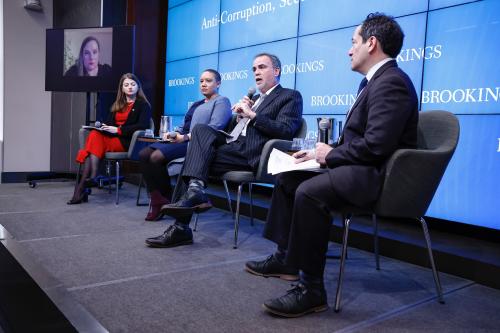In the early days of Russia’s full-scale invasion of Ukraine in 2022, amid reports that Russian death squads had infiltrated the country to assassinate President Zelensky, the U.S. offered to evacuate him from Kyiv. Zelensky reportedly quipped, “I need ammunition, not a ride.” Recently, he got both when the White House announced new U.S. support for Ukraine. Zelensky visited Pennsylvania’s Scranton Army Ammunition Plant, a United States Army Joint Munitions Command (JMC) facility, which makes the 155-millimeter artillery shells Ukrainians need to continue fighting Putin-led Russia. The stakes could not be higher: As a worker at a Pennsylvania army depot noted, “what we [are] doing directly affects whether people live or die.”
For many in Pennsylvania, with the federal government sending nearly $1.6 trillion to Pennsylvanian defense companies as of December 2023, assistance to Ukraine means—among other things—a surge in new well-paying manufacturing jobs in communities like Scranton. For Americans in Pennsylvania and across the U.S., however, it also means something more: a return to a proud bipartisan tradition and legacy of America supporting and providing assistance to democracies that stand up to tyranny.
“We must be the great arsenal of democracy,” President Roosevelt proclaimed in a December 29, 1940 radio address. He argued for the U.S. to provide more military aid to Britain and countries fighting Nazi Germany and Axis partners. That assistance, buttressed by the labor of millions of American workers, was critical to defeating Axis powers, safeguarding U.S. democracy and security, and winning World War II.
Now the forces of autocracy are rising with strengthened networks that threaten the U.S. and partners. These autocratic regimes are trying to disrupt U.S. elections and seek to weaken U.S.-Ukraine cooperation and democracy globally.
Historically, autocracies have been capable of coordinated efforts. Nazi Germany, Imperial Japan, and Fascist Italy formed the “Axis Powers” which collaborated before and during World War II. Today, help from the emerging axis of other authoritarian states—Iran, China, and North Korea—is vital to Russia’s efforts to evade sanctions and keep its military supplied with the weapons used to target Ukrainian civilians. These authoritarian states have a shared interest in making the world more hostile to democracy and freedom.
America and its partners have the tools, conviction, and interest to prevent a return to a world in which wars of conquest, mass killings, and illegal annexation are permitted. That deepfelt motivation extends to Americans who support aiding Ukraine. Americans favor continuing to supply Ukraine with weapons by a 23-point margin and support authorizing Ukraine to use weapons to strike targets inside Russia by a 25-point margin. Americans understand that what Putin and Russia have done in Ukraine is wrong and that dictatorships triumph when people and nations do nothing to stand up to bullies and autocrats.
A handful of members of Congress have tried to make a partisan issue of Zelensky’s visit to Pennsylvania even though the Ukrainian President visited other U.S. states, including Utah, where he signed a memorandum of understanding with Utah officials.
It is more important than ever that U.S. support for Ukraine remain bipartisan as it has been in Congress since February 2022. Unity is needed on both ends of Pennsylvania Avenue to ensure Ukraine gets the support it needs and to deter watchful autocrats from seeing Putin’s aggression as a winning strategy, including Xi in Taiwan. During his visit, Zelensky delivered a clear message: “the war in Ukraine needs to be stopped. Putin can’t win. Ukraine has to prevail.”
Democracies are strongest when they stand together in the face of autocracy, as many Americans of both parties have done for decades. That solidarity, an unshakeable pillar of U.S. security, should be bolstered by standing with Ukraine, not punctured by disunity and praise for autocrats at the expense of allies and partners. We need to go beyond rancor and ensure that America remains the “arsenal of democracy”—committed to supporting partners and allies and ensuring our nation’s safety and prosperity. The arsenal of democracy in support of Ukraine was echoed perfectly by Joe Leary, President of the Local 847 International Association of Machinists and Aerospace Workers Union, who said, “Our members do this work every day, with little notice or fanfare…We were just happy to see Zelensky up close, because we want him to win.”
The Brookings Institution is committed to quality, independence, and impact.
We are supported by a diverse array of funders. In line with our values and policies, each Brookings publication represents the sole views of its author(s).









Commentary
Op-edDemocracies are strongest when they stand together
October 16, 2024